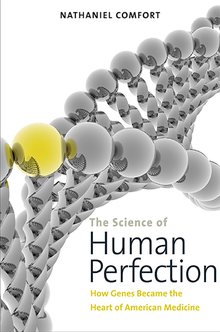The Science of Human Perfection
WARNING
You are viewing an older version of the Yalebooks website. Please visit out new website with more updated information and a better user experience: https://www.yalebooks.com
How Genes Became the Heart of American Medicine
Nathaniel Comfort
A thoughtful new look at the entwined histories of genetic medicine and eugenics, with probing discussion of the moral risks of seeking human perfection
Almost daily we hear news stories, advertisements, and scientific reports promising that genetic medicine will make us live longer, enable doctors to identify and treat diseases before they harm us, and individualize our medical care. But surprisingly, a century ago eugenicists were making the same promises. This book traces the history of the promises of medical genetics and of the medical dimension of eugenics. While mindful of the benefits of genetic medicine, the book also considers social and ethical issues that cast troublesome shadows over these fields.
Keeping his focus on America, Nathaniel Comfort introduces the community of scientists, physicians, and public health workers who have contributed to the development of medical genetics from the nineteenth century to today. He argues that medical genetics is closely related to eugenics, and indeed that the two cannot be fully understood separately. He also carefully examines how the desire to relieve suffering and to improve ourselves genetically, though noble, may be subverted. History makes clear that as patients and consumers we must take ownership of genetic medicine, using it intelligently, knowledgeably, and skeptically.
“Comfort explains how eugenics became part of medicine, and how medical and human genetics therefore derive in large part from eugenics. The great strength of this book is to work this through agnostically and calmly.”—Alison Bashford, The University of Sydney
“[An] intriguing history…Comfort provides some complex food for thought about the balance between creating good for individuals and for the human species, and about the ways we define the methods we use.”
—Publishers Weekly
“Other books. . . have traced portions of the history of genetics, but none have put together the whole story in the way that Comfort has.”—Choice
Publication Date: January 14, 2014
25 scattered b/w images









